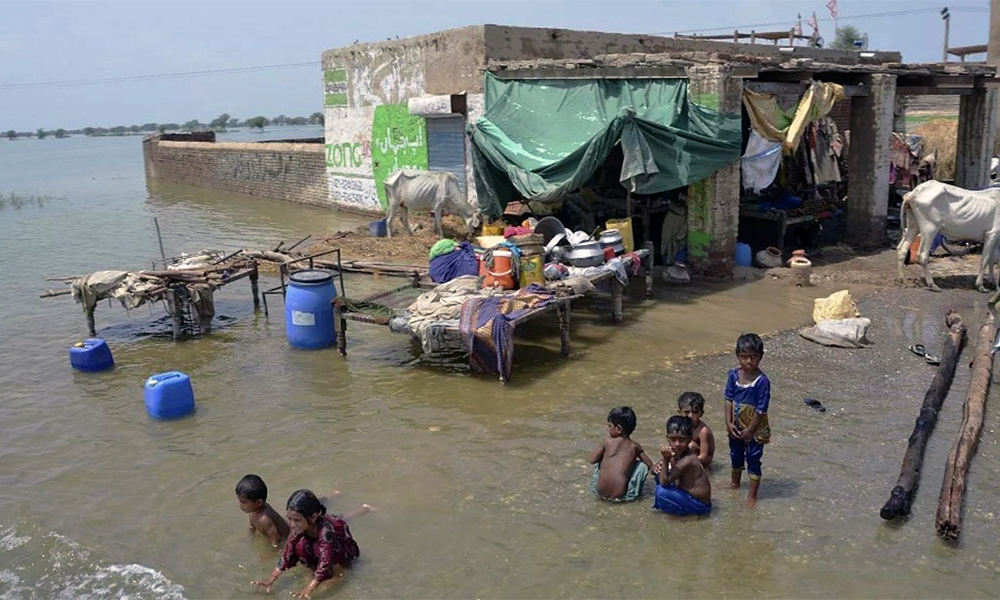Climate Change
Up to 4 million children in Pakistan still living next to contaminated flood water

More than four months after a national state of emergency was declared in Pakistan, up to 4 million children are still living near contaminated and stagnant flood waters, risking their survival and wellbeing, UNICEF warned on Tuesday.
Acute respiratory infections among children, a leading cause of child mortality worldwide, have skyrocketed in flood-stricken areas. In addition, the number of cases of children identified as suffering from severe acute malnutrition in flood-affected areas monitored by UNICEF nearly doubled between July and December as compared to 2021; an estimated 1.5 million children are still in need of lifesaving nutrition interventions.
“Children living in Pakistan’s flood-affected areas have been pushed to the brink,” said Abdullah Fadil, UNICEF Representative in Pakistan.
“The rains may have ended, but the crisis for children has not. Nearly 10 million girls and boys are still in need of immediate, lifesaving support and are heading into a bitter winter without adequate shelter. Severe acute malnutrition, respiratory and water-borne diseases coupled with the cold are putting millions of young lives at risk.”
In Jacobabad, a southern district where many families have little more than mere cloth to cover their makeshift shelters by stagnant floodwaters, temperatures have dropped down to 7 degrees Celsius at night. In mountainous and high-altitude areas, which have also been affected by the floods, snow has fallen, and temperatures have dropped below 0 degrees Celsius.
UNICEF and partners have started providing items such as warm clothing kits, jackets, blankets and quilts, aiming to reach nearly 200,000 children, women and men. In response to the worsening child survival crisis, more than 800,000 children have been screened for malnutrition; 60,000 were identified as suffering from severely acute malnutrition – a life-threatening condition.
UNICEF health interventions have reached nearly 1.5 million people with primary health care services so far, and 4.5 million children have been immunized against Polio in 16 flood-hit districts. UNICEF and partners have also provided more than one million people with access to safe drinking water, and one million with hygiene kits. In the months ahead, UNICEF will continue to respond to urgent humanitarian needs, while also restoring and rehabilitating existing health, water, sanitation and education facilities for families returning home.
Fadil said: “We know the climate crisis played a central role in supercharging the cascading calamities evident in Pakistan. We must do everything within our power to ensure girls and boys in Pakistan are able to fully recover from the current disaster, and to protect and safeguard them from the next one.”
To provide immediate life-saving support, UNICEF is calling for the international community to urgently provide additional humanitarian assistance, and ensure the timely release of funding to save lives before it is too late.
UNICEF’s current appeal of US$173.5 million to provide life-saving support to women and children affected by the floods remains only 37 percent funded.
Meanwhile, the UN held a conference in Geneva on Monday where Secretary-General António Guterres urged donors to help fund Pakistan’s recovery plan.
He told delegates that if anyone doubts climate change, then they should go to Pakistan. “There is loss. There is damage. The devastation of climate change is real. From floods and droughts to cyclones and torrential rains. And as always, those countries least responsible, are the first to suffer.”
Climate Change
Rescuers race to reach those trapped by floods in China’s Guangdong

WATCH: Rescuers on boats in China’s flood-ravaged Guangdong province raced to evacuate trapped residents, carrying some elderly people by piggyback from their homes and deploying helicopters to save villagers caught in rural landslides.
The southern Chinese province has been battered by unusually heavy, sustained and widespread rainfall since Thursday, with powerful storms ushering in an earlier-than-normal start to the region’s annual flooding season, Reuters reported.
Eleven people were missing in Guangdong by Monday morning, the state-owned Xinhua News Agency reported without giving further details.
Across the province, 53,741 people have been relocated, with 12,256 people being urgently resettled, Xinhua reported, citing the provincial government.
The cities of Shaoguan, Qingyuan, Zhaoqing and Jiangmen to the west and north of the provincial capital Guangzhou have been particularly hard hit.
In Qingyuan, houses and shops along the Bei River were submerged as the Pearl River tributary swelled, local media reported.
Aerial footage showed flood waters overwhelming a nearby town, leaving only roofs and treetops untouched.
Rescuers in Qingyuan tackled muddy waters, neck-high in some areas, to extract residents, including an elderly lady trapped in waist-deep water in an apartment building, videos on social media showed.
Other social media videos showed water gushing through roads and vehicles in disarray.
In Shaoguan, landslides trapped villagers who had to be rescued by helicopter while other rescuers traveled on foot to reach cut-off disaster sites, Reuters reported.
The Chinese military also stepped in to help clear roads.
The rains eased early on Monday, but some schools in the province were suspended.
Powerful thunderstorms are expected to return later in the week after a brief respite, marking an unusually early wet spell that is more typical in the months of May and June.
Climate Change
Massive river flooding expected in China, threatening millions

Major rivers, waterways and reservoirs in China’s Guangdong province are threatening to unleash dangerous floods, forcing the government on Sunday to enact emergency response plans to protect more than 127 million people.
Calling the situation “grim”, local weather officials said sections of rivers and tributaries at the Xijiang and Beijiang river basins are hitting water levels in a rare spike that only has a one-in-50 chance of happening in any given year, state broadcaster CCTV news said on Sunday.
China’s water resource ministry issued an emergency advisory, CCTV reported.
Guangdong officials urged departments in all localities and municipalities to begin emergency planning to avert natural disasters and promptly disperse disaster relief funds and materials to ensure affected people have food, clothing, water and a place to live, Reuters reported.
The province, a major exporter and one of China’s main commercial and trading centers, has seen torrid downpours for several days and strong winds due to severe convective weather, which has also affected other parts of China.
A 12-hour stretch of heavy rain, starting from 8 p.m. (1200 GMT) Saturday, battered the central and northern parts of the province in the cities of Zhaoqing, Shaoguan, Qingyuan and Jiangmen.
Almost 20,000 people have been evacuated in Qingyuan, according to state media, and some power facilities in Zhaoqing were damaged, cutting power to some places, Reuters reported.
Climate Change
UN sounds ‘Red Alert’ as world smashes heat records in 2023

Every major global climate record was broken last year and 2024 could be worse, the World Meteorological Organization (WMO) said on Tuesday, with its chief voicing particular concern about ocean heat and shrinking sea ice, Reuters reported.
The U.N. weather agency said in its annual State of the Global Climate report that average temperatures hit the highest level in 174 years of record-keeping by a clear margin, reaching 1.45 degrees Celsius above pre-industrial levels.
Ocean temperatures also reached the warmest in 65 years of data with over 90% of the seas having experienced heatwave conditions during the year, the WMO said, harming food systems.
“The WMO community is sounding the Red Alert to the world,” said WMO Secretary-General Celeste Saulo, who took over the job in January.
“What we witnessed in 2023, especially with the unprecedented ocean warmth, glacier retreat and Antarctic sea ice loss, is cause for particular concern.”
She later told reporters that ocean heat was particularly concerning because it was “almost irreversible”, possibly taking millennia to reverse.
“The trend is really very worrying and that is because of the characteristics of water that keep heat content for longer than the atmosphere,” she said.
Climate change, driven by the burning of fossil fuels, coupled with the emergence of the natural El Nino climate pattern, pushed the world into record territory in 2023, read the report.
WMO’s head of climate monitoring, Omar Baddour, told reporters there was a “high probability” that 2024 would set new heat records, saying that the year after an El Nino was typically warmer still.
Tuesday’s report showed a big plunge in Antarctic sea ice, with the peak level measured at 1 million km2 below the previous record – an area roughly equivalent to the size of Egypt.
That trend, combined with ocean warming which causes water to expand, has contributed to a more than doubling of the rate of sea-level rise over the past decade compared with the 1993-2002 period, it said.
Ocean heat was concentrated in the North Atlantic with temperatures an average 3 degrees Celsius above average in late 2023, the report said. Warmer ocean temperatures affect delicate marine ecosystems and many fish species have fled north from this area seeking cooler temperatures, Reuters reported.
Saulo, a meteorologist from Argentina who has promised to strengthen global warning systems for climate disasters, said she hoped the report would raise awareness of the “vital need to scale up the urgency and ambition of climate action”.
“That’s why we spoke about the Red Alert because we must care for the people and how they will suffer from these more frequent, more extreme events,” she told reporters. “If we do nothing, things will become worse and that will be our responsibility.”
-

 Sport5 days ago
Sport5 days agoAfghanistan Champions League kicks off with grand opening ceremony
-

 Latest News4 days ago
Latest News4 days agoPakistan’s frontiers minister stresses ‘dignified’ return of Afghan refugees
-

 Latest News5 days ago
Latest News5 days agoMore than 800 Afghan refugees deported from Pakistan in two days
-

 Regional3 days ago
Regional3 days agoIranian president lands in Pakistan for three-day visit to mend ties
-

 Climate Change4 days ago
Climate Change4 days agoMassive river flooding expected in China, threatening millions
-

 Latest News4 days ago
Latest News4 days agoChinese keen to invest in Panjshir-Kabul water conduit project
-

 World4 days ago
World4 days agoTwo Japan navy helicopters crash, one body found, 7 missing
-

 Latest News2 days ago
Latest News2 days agoRashid Khan named AWCC’s brand ambassador
























